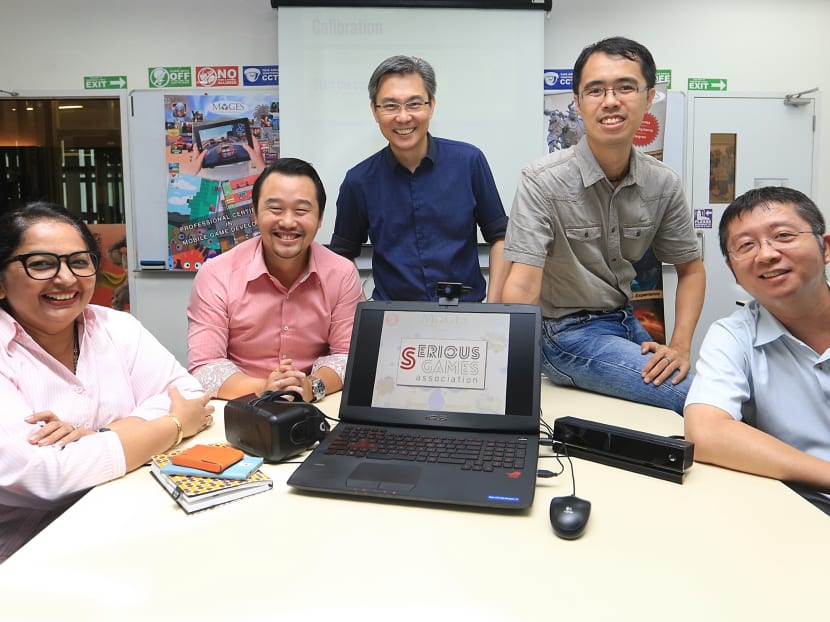Using serious gaming to tackle real-world problems
SINGAPORE — Mention the phrase “serious games” and people usually give Mr Ivan Boo a quizzical look, or ask whether they are meant for children.

Members of the Serious Games Association: Neeru Bahl, Koo Seng Meng, Ivan Boo, Fredrik Lee, Loh Yong Joo, posing with game gadgets on April 1, 2016. Photo: Koh Mui Fong/TODAY
SINGAPORE — Mention the phrase “serious games” and people usually give Mr Ivan Boo a quizzical look, or ask whether they are meant for children.
“The problem with games,” he told TODAY, “especially in Asia and our region, is that there are a lot of unknowns and hesitations and negative connotations.
“People think (serious games are) just for young people to play for fun ... no one here really knows that they can be used for other purposes.”
Serious games, also known as applied games, are a growing field of gaming technology that simulates real-world events to solve specific problems.
Mr Boo, 47, is chairperson of the Serious Games Association (SGA), which was founded in 2012 and now has about 30 members.
Its aim is to link game developers with domain experts and to provide a communication channel for them, but it is also involved in projects with the public sector.
Mr Boo said serious games are slowly gaining traction in Singapore and are at the beginning stages in Asia.
“So, we are trying to get a lot of them going and trial-testing them here in Singapore,” he added.
One such partnership was announced last Monday, when the association signed a Memorandum of Intent with the National Healthcare Group and the Infocomm Development Authority of Singapore to pledge further collaboration in applying serious gaming technology to find solutions within the healthcare industry.
SGA has also reached out to several organisations, including the Singapore Workforce Development Agency (WDA) and voluntary welfare organisation O’Joy Care Services, to use the technology.
One SGA project, called “Healthier Nation, Smart Nation”, is conducted in partnership with voluntary welfare organisation O’Joy Care Services, which provides mental health and community programmes for residents of Upper Boon Keng Road.
Targeted at seniors aged 60 and above, the initiative aims to help the residents monitor their health and have fun at the same time.
Through playing games on Xbox 360’s Kinect platform, data on the seniors’ physical movements, blood pressure and weight are captured and sent to their smartphones.
The players also earn points that are displayed on a game board that all the participants can see. In addition, the points can be converted to discounts at certain retailers.
Development work will start in May, and it will be rolled out by this August.
Another similar initiative dubbed the National Senior Games, which O’Joy will roll out in June, will involve seniors competing with their grandchildren on the Kinect. The data recorded can be used to monitor the seniors’ vital signs and provide early-stage medical interventions, while the competition element promotes intergenerational bonding.
Mr Choo Jin Kiat, executive director of O’Joy, said: “Gaming is something we’ve been looking at, but there are no suitable games for the elders. Sometimes, the language medium is
a problem, like when games are in English.”
The new games will be tailored to suit the residents’ speed and mobility, and about 130 of them are expected to benefit from both plans, the centre said. Mr Boo added that SGA and O’Joy are reaching out to a few more care organisations to “make the competition fun”.
In another project, the SGA is working with the WDA to organise a workshop to equip employers with the skills to implement serious gaming in their talent development strategies. The WDA said this is targeted to be rolled out by the third quarter of this year.
Mr Boo said: “We can add scientific information into the game itself, and it becomes engaging. That will enable the user to take advantage of what is very serious in nature, and play it out just like a game.”











